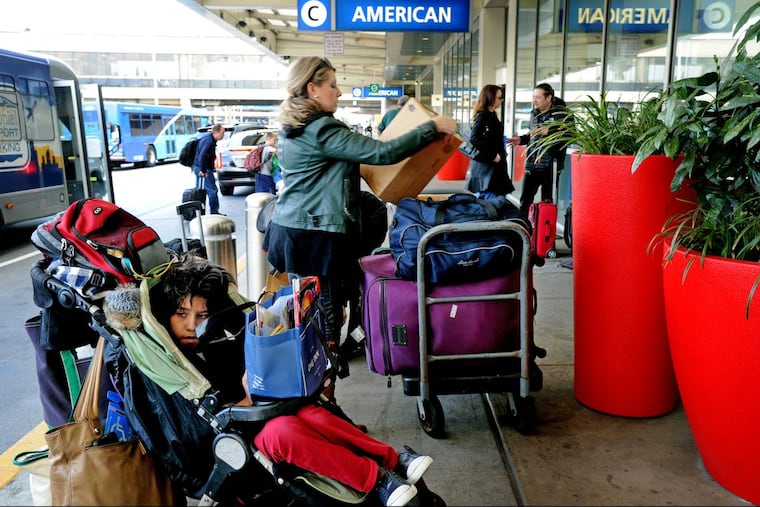U.S. airports want to nearly double passenger user fees added to ticket prices; airlines say 'no'
Airports favor an $8 increase on round-trip airline tickets to pay for facility upgrades. Airlines and consumer groups says it will discourage budget-conscious travelers from flying.

If the nation's airports get their way, passengers could see an $8 increase on a round-trip airline ticket.
Airports now receive a facility-use passenger fee of $4.50 per flight and want Congress to increase the cap to $8.50 a ticket for departing flights – that's $8.50 when fliers get on a plane to leave on a trip, and $8.50 when they board a flight to return home.
The proposed increase was approved in a Senate appropriations bill in July and is before a House conference committee considering budget legislation.
Airports say the higher fee is needed for construction projects and to improve aging facilities. Airlines and the trade association Airlines for America, oppose the increase, saying it will discourage families and budget-sensitive air travelers.
"The increase gets hidden within advertised airfares, leading passengers to believe it is a fare increase when in actuality it is a tax increase," said Nicholas Calio, president and CEO of Airlines for America.
In Philadelphia, the usage fee generated about $61.8 million last year, and has helped pay debt on bonds to build the international Terminal A West, Terminal F, the expansion to Terminals D and E, as well as airfield and other improvements.
Airlines contend that airports can get money in other ways, including airline leases and charges, rents and fees paid by rental-car companies, concessionaires, parking, and federal grants.
Delta Air Lines said that airports will rake in a record $3.6 billion in passenger facility charge taxes this year, and an additional increase "is not only unnecessary but harmful." The Atlanta-based carrier cited studies by the U.S. Government Accountability Office that for every $1 increase in the passenger facility charge, passenger demand declines by more than 1 percent.
Airports Council International-North America, representing the nation's airports, said the $4 fee increase on a one-way ticket is modest compared with the charges by airlines for add-on fees to check a bag, for seats with extra legroom, and $200 to change a ticket reservation. Some now charge to put a carry-on in the overhead bin.
Airlines collected more than $7.1 billion in bag and ancillary fees last year — twice more than the $3.2 billion that airports collected in passenger facility fees, said Kevin Burke, the airports council president and CEO.
Lined up against a higher fee are Travelers United, a consumer advocacy group; FlyersRights.org, a passenger rights group; and National Taxpayers Union, a citizen group working on tax relief and reform. Supporting the increase are the American Association of Airport Executives and the U.S. Travel Association, whose members include hotels, convention and visitor bureaus, and car-rental operators.
Both sides are lobbying lawmakers.
An increase in the facility fee was approved by the Senate Appropriations Committee in July and is now being considered by the House as part of the current federal budget.
Congress capped the fee at $4.50 in 2000, but with inflation and higher construction costs, airports say that buys only half of what it did 17 years ago.
Airlines collect the passenger facility fee, which is distributed to airports based on where the passenger's flight departed. Philadelphia International Airport gets a $4.50 fee for each flier departing PHL.
"It's already done on the Senate side. It's a done deal there," said Travelers United president Charles Leocha. "Now our big question is how do we stop it on the House side, or can we?"
Paul Hudson, president of FlyersRights.org, said any fee increase should be debated in "open congressional hearings" along with other changes "needed to repeal the laws, policies and regulations that have made the United States the only major nation to have built no new major airport in nearly 40 years and with none even planned."
The federal government collects a slew of taxes on commercial airline tickets, including an excise tax on fares, a security fee implemented after the September 2001 attacks, and a flight segment tax for travel within the United States. International travelers face even more taxes, said Pete Sepp, president of the National Taxpayers Union.
The passenger facility charge is the only fee that does not go to the government but is turned over to airports.
"The combined tax burden on a typical airfare now is above 20 percent, which is simply outrageous," Sepp said. "A middle-class 1040 income tax return has a lower average rate than that. When a typical middle-class family has to pay a higher tax rate to fly than they do on their 1040 tax return, something is dreadfully wrong."